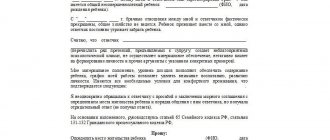A large number of couples are faced with the topic of divorce. For some, a broken marriage is considered the opening of a new life, for others it is a tragedy, and for others, divorce causes a lot of problems.
Most often, men face problems after divorce proceedings. Ex-wives, according to statistics, do not feel sorry for their ex-spouses and try to cause them a lot of trouble, trying to prove that they were much better off in their marriage.
Often, in order to hurt their ex-husband, women manipulate the child, forbidding the father to see and communicate with him. Men who do not understand women’s intrigues react violently to this fact and become furious, which increases the woman’s sense of superiority.
The law is on the father's side
No matter how the ex-wife is against communication between father and child, the legislation of the Russian Federation assigns a number of rights to the father of the child, for example, the right to raise the child and care for the child’s health. In addition, the father has the right to:
- Meetings with a child. The father has the opportunity to communicate with the child according to Art. 66 of the Family Code of the Russian Federation, the ex-wife has no right to interfere with meetings. If the dispute between the former spouses is not resolved voluntarily, then meetings are scheduled by court decision.
- Changing the child's surname. If upon marriage the child was given the mother's surname, then at the child's request the surname can be changed to the father's surname.
- Obtaining information about the child from his mother. The father can receive information about the health of his child, his place of residence, his dream of study, etc., from the child's mother.
- Possibility of taking a child abroad. The father has the right to take the child abroad with the consent of the child's mother. If a dispute arises on this issue, the father may go to court in accordance with Art. 20 of the Federal Law.
My wife won't let me see my child
Contrary to a court decision and a voluntary agreement between the parties, the ex-wife can still interfere with communication between father and child for personal reasons.
Most often, these situations end in court proceedings, after which the father is assigned days to meet with the child.
In accordance with Art. 65 of the Family Code of the Russian Federation, the child’s parents must regulate all issues regarding the upbringing and education of the child by mutual consent and taking into account the child’s opinion.
If the child’s parents do not reach unity in resolving issues about the child, the father has the right to file a claim in court to remove the obstacle in communication with the child. If a peace agreement between the parents was still not reached and the father had to take extreme measures, then to go to court he will need a statement of claim , which should include:
- The name and location of the district court where the appeal is sent.
- Contact details of the child's father and mother.
- Child's contact details.
- Contact details of the guardianship and trusteeship authority.
- The conditions upon which the father bases the claim and the supporting evidence.
- Evidence showing the child's father's desire to reach an amicable agreement with the mother regarding time spent with the child.
After drawing up a statement of claim and initiating a case in court, the child’s father should get a lawyer to correctly represent his rights in court. The child's father should prepare for a long trial and hearing the wishes of the child's mother. The court, in accordance with the law, considers the declared case and makes a decision in favor of one of the parents.
If the court makes a decision in favor of the father, but the child’s mother also prevents communication and meetings, then, according to Art. 66 of the Family Code of the Russian Federation, measures provided for by law may be taken in relation to the mother of the child. The consequences of a mother’s ban on the child’s communication with the father after a court decision are:
- Formation by the court of a period during which the mother is obliged to comply with the court decision.
- Granting the father the rights to hand over the child for upbringing.
Rules for communication between father and child after divorce
The rules of communication between dad and baby are not clearly regulated by legal norms; they stem from real practice. Communication with a child can be organized in various forms and types without the consent of the wife:
- Meetings on neutral territory.
- Visiting a cafe, circus or amusement park.
- Playing games together, visiting the zoo or otherwise.
- Trips to vacation spots, but if the child crosses the border of the Russian Federation, it is necessary to obtain the consent of the second parent, that is, the wife.
- Conversations on the phone, via video calling, via the Internet.
- Communication using SMS, messages or modern instant messengers.
Parents have the right to choose the most optimal and convenient form for both themselves and the child. Establishing the procedure and rules for communication between a parent with whom the minor does not live can be done with the help of:
- Oral agreement - the husband and wife in the process of divorce did not make a separate claim on the claim, they resolved all the difficulties independently and peacefully.
- Peace agreement, according to Art. 66 of the RF IC, this is a document reflecting the mutual decision of parents on issues of communication, child support and other most significant issues. Concluding an agreement between husband and wife is convenient if the spouses are not confident in the possibility of maintaining a positive relationship. If the need to go to court arises, the agreement will be more important than an oral agreement.
- Judicial resolution of disputes - the judge fixes clear rules and procedures for communication between the father and the child. This is an option in which the parties were unable to agree peacefully, and a need arose for a court decision to resolve conflicts.
The rules of communication in any case should be guided by the interests of the minor. The controlling body is the guardianship and trusteeship office, whose employees supervise the legality of the parties’ actions; you can complain to them if the ex-wife does not allow you to see the child.
Legal assistance
In complex disputes that arise with your ex-wife, the issue of raising a child may remain unresolved. To more accurately formulate the father’s wishes and actions in accordance with the legislation of the Russian Federation, the child’s father must seek help from a qualified specialist - a lawyer.
The father of the child can turn to a lawyer for both advice and help. During the consultation, the lawyer will explain the procedure for resolving disputes with the ex-wife, list a list of documents for filing a claim in court, provide and explain a number of rights of the father to raise the child.
When providing assistance, the lawyer draws up and collects the necessary documents for the statement of claim, represents interests at the court hearing and monitors the parties' compliance with the court decision.
The cost of a lawyer’s services will depend on the provision of the service, for example:
- Telephone consultations – up to 2000 rubles.
- Consultations by e-mail or sending in a letter - up to 4,000 rubles.
- Preparation of papers – up to 8,000 rubles.
- Representation in court in civil cases – up to 40,000 rubles.
Specific amounts for the provision of legal services will depend on the complexity of the case, the time of application and the conditions under which the child’s father goes to court.
Child's property
The child has the right to use individual things. In addition, both parents are required to provide funds for the child’s livelihood.
A child who has not reached the age of majority has the right of ownership to all income and property received by him, without exception. All funds received by the child, for example, alimony, benefits, go to the disposal of the parent with whom the child lives.
The child's powers are protected by the Housing Code, in accordance with which the child has the right to his own share of the living space, even after the dissolution of the marriage between his parents.
Cases from practice
In practice, there are many cases in which a decision between spouses was made both peacefully and by court decision. Most often, parents understand that divorce and related matters have a detrimental effect on the child and try to resolve all problems and issues among themselves without bringing the action to trial.
But there are parents who try to annoy each other at the expense of the child and resort to a court decision to tighten the rules for communication and raising a child for each other.
As an example from practical activities, the following case can be cited:
The wife insisted on divorce and submitted the appropriate documents; her husband agreed to the divorce and gave the go-ahead for his son to live with his mother and pay alimony.
Some time after the divorce, the ex-wife considered the rules of the contract and the demands of the child’s father to be excessive and put a ban on communication between the father and the child.
The child's father went to court to establish a solution to this dispute, but the only aggravating factor for him was living hundreds of kilometers from his son and ex-wife.
In this trial, the court decided in favor of the father and set the days for him to meet with the child, but the ex-wife did not like this decision, and she decided to stop communication between the child and the father completely. Due to the circumstances, the child’s father was forced to go to court again in order to bring the child’s mother to justice for failure to comply with the court decision.
After the child's father contacted a lawyer, enforcement proceedings were organized, according to which the child's mother was held accountable for non-compliance with the court decision.
If the trial turns out positively in favor of the father, then the most important points for its execution should be communication and meetings with the child. This right must be implemented in a short time, since after a court decision in favor of the father, the child’s mother can turn the child against her ex-husband in order to overcome the child’s desire to see and maintain a relationship with the father, thereby causing rejection and hatred in the child.
My ex-wife won't let me see my child, what should I do?
Quite often, despite court decisions, agreements between the parties and oral agreements, the mother does not allow the father to see the child. A decision is possible only in court, during which the judge will consider and evaluate all the circumstances and make an objective decision. Art. 65 of the RF IC indicates that parents in their relationships should be guided by the rights and interests of the children, therefore, preventing the father from seeing the baby by his wife is, first of all, a violation of the rights of the minor himself.
Attention
The judicial procedure for resolving disputes begins with determining jurisdiction. Issues related to the procedure for communication and the place of residence of the child are considered in the district courts at the place of residence of the mother and baby as the defendant. This rule is enshrined in Art. 23 and Code of Civil Procedure of the Russian Federation.
In the consideration of civil cases related to the interests of children, including if the ex-wife does not allow him to see the child, guardianship and trusteeship authorities must take part. Authorized specialists inspect the living quarters in which children live, examine the mother’s capabilities and the living conditions of the children. Based on the results, an inspection report is issued, in court the specialist expresses his position and evaluates what is happening. This rule is reflected in Art. 78 RF IC.
According to Art. 57 of the RF IC, if a child has reached the age of 10 years, he has the right to express his opinion and express his position regarding the order and rules of communication with his father.
The provisions of administrative legislation provide for the possibility of bringing a mother to justice if she creates obstacles for the father to meet with a minor.
The main rules for communicating with a child after a divorce
After the divorce process and the resolution of disputes about the upbringing of the child, communication between the father and the child should take place in the same form as before, before the divorce.
The father must show the child his desire to communicate and participate in his life, despite the events that happened in the relationship between the parents.
The child should not feel disadvantaged in any way or experience discomfort from the feeling that the parents are not together now.
The main goal of parents after a divorce is to maintain friendly relations for the upbringing and growth of the child. If the relationship has failed completely and its restoration is impossible, then it is also not worth influencing the child and turning him against the other parent, you just need to give the child a feeling of comfort and security, give the child confidence that his parents need him.
Drawing up an agreement on the procedure for communicating with a child after a divorce
Art. 55 of the RF IC indicates that a child has every right to maintain communication with both parents and with grandparents, sisters, brothers and other relatives without the consent of the mother. The dissolution of the union of a husband and wife, its recognition as invalid, the fact of cohabitation do not affect communication, upbringing and contact with the child.
Part 2 art. 66 of the RF IC provides for the right of parents to enter into an agreement on the procedure for exercising parental rights in writing. There are the following provisions of the agreement that must be taken into account:
- Drawing up in writing, both by hand and in printed form, as desired.
- The conclusion is by mutual consent - neither party should be subject to coercion from third parties or the second parent.
- Notarization is not required, but is recommended. It is the apostille, the signature of the notary, that secures the legal force of the document.
- The agreement can be entered into in court proceedings when the claim was originally filed. Considering that the legal process is quite lengthy, the parties can enter into an agreement at any time by reaching an amicable agreement. In such a situation, the judge is responsible for certifying the document, which is enshrined in Art. 153.10 Code of Civil Procedure of the Russian Federation.
The content of the agreement between husband and wife on the procedure for communicating with the child after divorce consists of the following provisions:
- Meeting place for ex-husband and baby. Here we mean the actual place, you need to indicate the format of communication - pick up from home, school, kindergarten, section. The territory in which actual communication takes place is also indicated. In practice, such places are considered to be dad's house, cafes, recreation parks, zoos, circuses, and dachas.
- Time – special attention should be paid to this situation. It is necessary to indicate clear meeting hours, for example from 10:00 to 18:00. Don’t forget to write down the meeting days, most often these are Saturday and Sunday. Periods of long meetings are also specified in the agreement - vacation time.
- Order, that is, ways of organizing communication. These could be additional meetings during the period of the baby’s illness, meetings alone without the mother, the possibility of being taken out of town without the consent of the wife, and so on.
Please note:
In each of the paragraphs, the legislator gives complete freedom of action to parents; they have the right to make their own decisions and clarify the rules, time and place of communication.
An approximate example of an agreement on the procedure for communicating with a child after a divorce is available. It should be remembered that each situation is individual and if you have difficulties with the formulation of certain provisions, you can contact a notary or a qualified lawyer.









